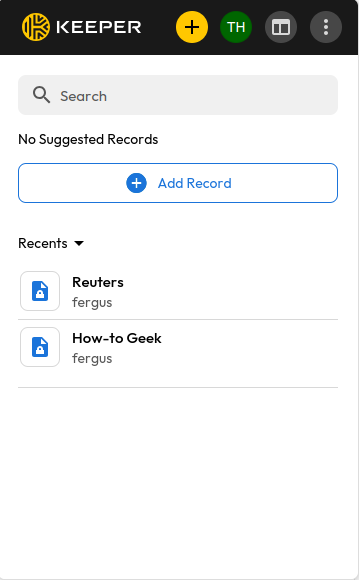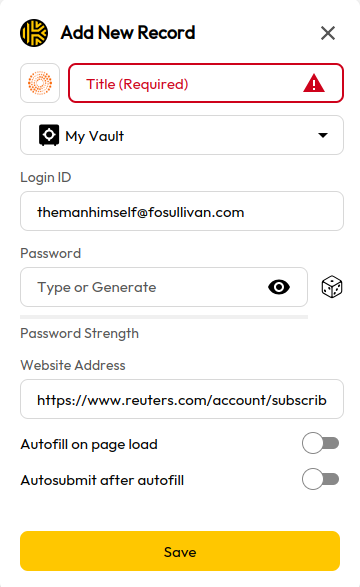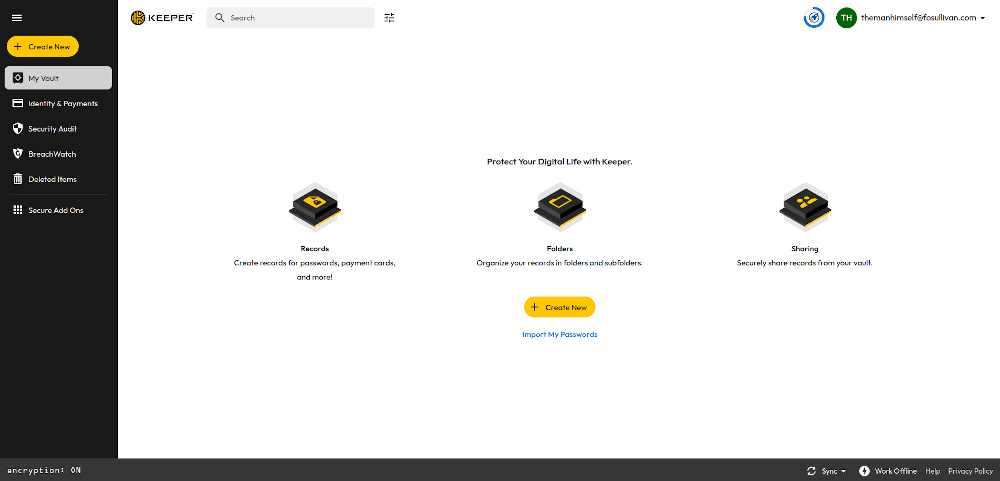Summary
- Keeper Security is a solid password manager with great organization features. Generating new entries is a little laborious, though.
- Pricing is good considering what you get, but features don’t stand out, either.
- Keeper Security provides top-notch security, including zero-knowledge encryption, and a bug bounty program to back it up.
Keeper Security is a popular password manager that promises to keep your data safe. It claims to be the most downloaded app of its kind, so I decided to take it for a spin and see if it lives up to the hype.

Keeper
Keeper Security is a solid password manager, yet offers little to stand out.
- Sleek app
- Good pricing for individuals
- Secure
- Saving passwords is a bit involved
- Family plan isn’t great value
What Can Keeper Security Do?
Keeper Security is a password manager that can help you keep you safe online by storing and autofilling your passwords for you, as well as other other types of data. If you’re serious about online security, a password manager is vital, and you could do a lot worse than Keeper Security. That said, there’s a reason it hasn’t quite made it into our selection of the best password managers, and I’m not sure if I’d recommend it, despite liking it.
Like most password managers, you operate Keeper Security through two ways: the app and the browser extension. The app can be accessed through either desktop or via your browser; I played around with both and they seem functionally identical. It’s really up to you what you prefer.
There are apps for Windows, Mac, and even Linux. Interestingly, Keeper Security has apps for different Linux distros, like Mint, Ubuntu, Debian, Fedora, and Red Hat. It’s extremely rare, maybe even unique, for password managers to have this many Linux options and this may be the deciding factor for some members of Team Penguin.
The app serves mainly as a way to manage your passwords, so adding and deleting them, as well as moving them around different folders. Most of your day-to-day interaction with Keeper Security will be through one of its many browser extensions. These are available for every major browser, and will let you generate passwords and autofill them as you surf along.

Here are some small issues. Though it wasn’t bad, as such, I didn’t quite like how Keeper Security handles making new entries (“records” in its parlance). Instead of prompting you with your usual email address, which other services do, you need to click on the Keeper icon, click to create a new record, and then fill out a small form.

While I appreciate how thorough this is, if you read my Proton Pass review you’ll see a much smoother way to handle it—though it’s not perfect, either. There are just fewer clicks needed, and less copy-pasting. While I like how sleek Keeper Security is designed, I feel the user experience could be a bit better.
That said, Keeper Security wins back some points thanks to its organization features. It reminds me a bit of 1Password (read my 1Password review for more on this great password manager) in that you get a lot of options on what kind of folders to create, what kind of records to add, and even the type of records you can add.

Though I’m not much of an organizer myself, I very much understand people who are and I have a feeling they’ll really appreciate the Keeper Security web app for letting them get their records just so.
Keeper Security Price
When it comes to pricing, Keeper Security is right in the middle of the pack. At $35 per year for individual users, it costs more or less the same as all major players—give or take a buck or two. The only big exception is Bitwarden, which on its optional paid plan costs just $10 per year; read my Bitwarden review for more on this excellent provider.
I like Keeper Security’s approach to pricing as it’s one and done, there are no stages with different options. You pay 35 bucks and Keeper opens the gates, you don’t need to figure out any angles.
The only step up is the Family plan, which is $75 per year for up to five users. I’m a fan of family plans as they’re a great way to secure the online accounts of a bunch of people at once, including kids, who may not know that it’s important to be careful online.
However, in my roundup of the best password managers for families I ranked Keeper last because I feel the plan is a bit pricey. 1Password is only $60 per year for the same number of users, and arguably a better product, while Bitwarden is only $40 per year for six users. While Keeper Security’s Family plan is far from bad, I can’t really recommend it either.
That said, Keeper Security makes it very easy to make your own decision as it offers a free 30-day trial. You don’t need a credit card or anything, just enter your email address and you’re off to the races. I like it when an online service makes it this easy to check it out for yourself.
How Secure Is Keeper?
As a vault for all your passwords and thus your digital life, a password manager has to be secure. As far as I can tell Keeper Security has this handled, with top-notch encryption and security protocols that should be able to handle most attacks—that said, though, nothing is ever completely safe.
On its security page Keeper lays out how it keeps your passwords safe. The most important of these are zero-knowledge security, which hides your master password from Keeper itself by encrypting your vault at the level of your device. This means nobody can get access to your vault by hacking Keeper Security itself, an important security layer.
Keeper Security also uses end-to-end encryption, meaning that any information you send over the web (when you store your passwords) is at no point decrypted: it’s encrypted on your device and stays that way until you need it. This is an important protection both against interception of your data, as well as further protecting against a breach on Keeper’s end.
Finally, Keeper Security also has a bug bounty program in place, which I always feel inspires confidence. In short, the company is inviting hackers to attack them, and if a vulnerability is found, they’ll be paid. If the company is this sure of their product, I think we should be safe, too.
Should You Subscribe to Keeper Security?
I want to really like Keeper Security: it’s got a lot going for it, and definitely has a lot more positives than negatives. However, while it’s a good password manager, its competition is made up of some great ones.
When compared to the likes of Bitwarden, 1Password, or Proton Pass, I think each one of them offers some edge that Keeper Security just can’t match. The result is that while Keeper does a good job, you can’t really recommend it over any other provider. It’s a shame, too, because it clearly has the expertise behind it to make it a real contender.

Keeper
Keeper Security is a solid password manager, yet offers little to stand out.






